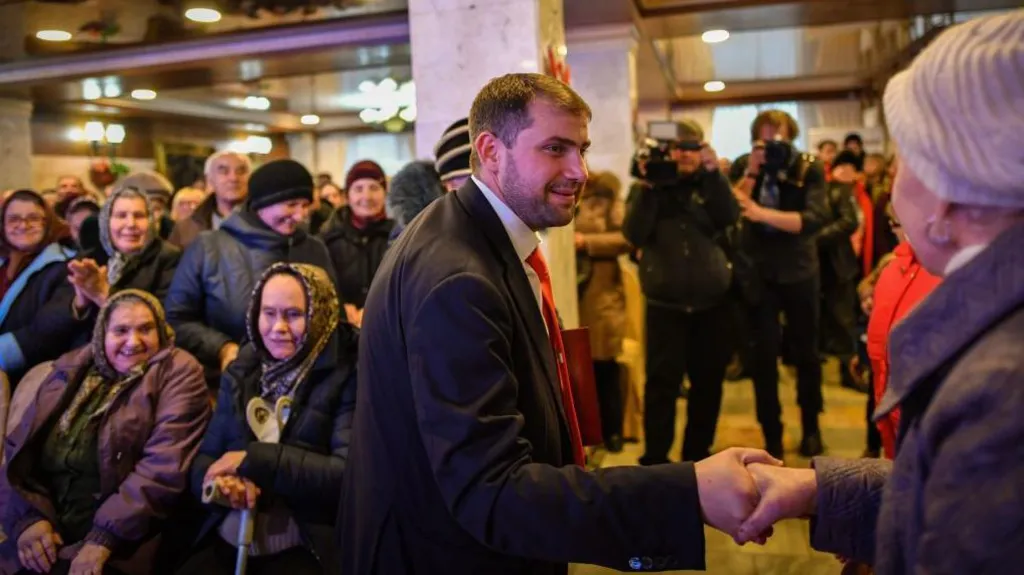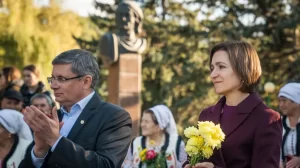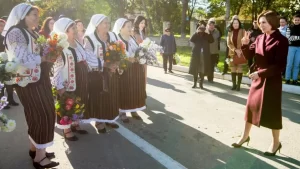Russian Influence and Electoral Integrity in Moldova
3 min read
Ilan Shor - pictured here while running for election in 2019 - fled the country before being sentenced in absentia for money laundering and embezzlement

Ilan Shor - pictured here while running for election in 2019 - fled the country before being sentenced in absentia for money laundering and embezzlement
In recent months, sniffer dogs at Chisinau Airport have intensified their efforts to detect unusual cash flows that might indicate Russian interference in Moldovan politics. One dog, Ami, has become quite adept at sniffing out money hidden within the luggage of passengers arriving from Moscow. This heightened vigilance follows a noticeable trend: customs officers began uncovering significant sums of cash among travelers, many of whom had never before traveled outside Moldova.
From May onward, customs officials reported finding passengers returning with thousands of euros—often amounts like 2,000, 3,000, or even 7,000. The customs chief, Ruslan Alexandrov, noted that this influx of cash was highly unusual for flights originating from Moscow. While carrying large sums of money is not illegal, the patterns raised alarms. “There were specific flights from Moscow to Istanbul and Yerevan, then to Chisinau,” Alexandrov explained. After police began seizing the cash, one single day saw the confiscation of $1.5 million, with no passengers requesting their money back.
Authorities suspect that these cash couriers are part of a broader operation orchestrated by Ilan Shor, a Moldovan oligarch living in Russia and wanted for major fraud. With Moldova gearing up for crucial elections, the airport has remained on high alert, particularly for flights from what are deemed “high-risk” routes.
This Sunday, President Maia Sandu is seeking re-election on a pro-European Union platform, facing challenges from ten candidates, many of whom have pro-Moscow sentiments. Voters will also participate in a referendum aimed at enshrining Moldova’s EU aspirations in its constitution. While membership talks have commenced, the nation has wrestled with its political identity since gaining independence after the Soviet Union’s collapse.

The geopolitical tug-of-war has intensified following Russia’s invasion of Ukraine. Sandu, an economist and former World Bank official, has shifted Moldova decisively towards the West, publicly identifying Russia as a significant security threat. While the Kremlin denies any involvement in Moldovan affairs, officials in Chisinau accuse Russia of attempting to destabilize the country through various proxies.
Veronica Dragalin, Moldova’s chief anti-corruption prosecutor, has highlighted the unprecedented scale of interference in the electoral process. Born in Moldova but raised in the U.S., Dragalin’s team has uncovered what they describe as a blatant scheme orchestrated from Russia by Shor and his associates. Evidence gathered through wiretaps and police informants reveals a complex pyramid payment system aimed at influencing the election outcome.
“The primary objective is to ensure the referendum fails,” Dragalin noted. As detection of cash couriers increased, funds began flowing through the sanctioned Russian bank, PSB. According to police chief Viorel Cernauteanu, by early October, around 130,000 voters—approximately 10% of the electorate—had received payments linked to this scheme, with $15 million transferred in September alone.

Despite laws prohibiting vote-buying, Moldova’s economic challenges make it easy for some to accept cash offers. Investigators remain uncertain about the funds’ origins, questioning whether they stem from Russian state sources, private entities, or funds misappropriated by Shor.
Shor himself is unrepentant, using social media to call for a “firm NO” to EU membership and endorsing candidates who align with his agenda. His popularity remains strong in regions like Gagauzia, where local leaders openly express admiration for both Shor and Russian President Vladimir Putin.
Ilya Uzun, deputy governor of Gagauzia, illustrates this sentiment, emphasizing a preference for strong leadership. He, along with many others in the region, remains influenced by Shor’s financial support and rhetoric, despite the oligarch’s criminal background.
As the election campaign reaches its climax, Sandu’s rally in Telenesti showcased her appeal to voters, urging them to reject “dirty money” and maintain Moldova’s trajectory toward Europe. However, the combination of external influence, internal divisions, and economic desperation complicates the electoral landscape.
Ultimately, the upcoming votes—both for the presidency and the referendum—represent pivotal moments for Moldova as it seeks to navigate its future amid foreign interference and domestic challenges. The stakes have never been higher for a nation at the crossroads of East and West.